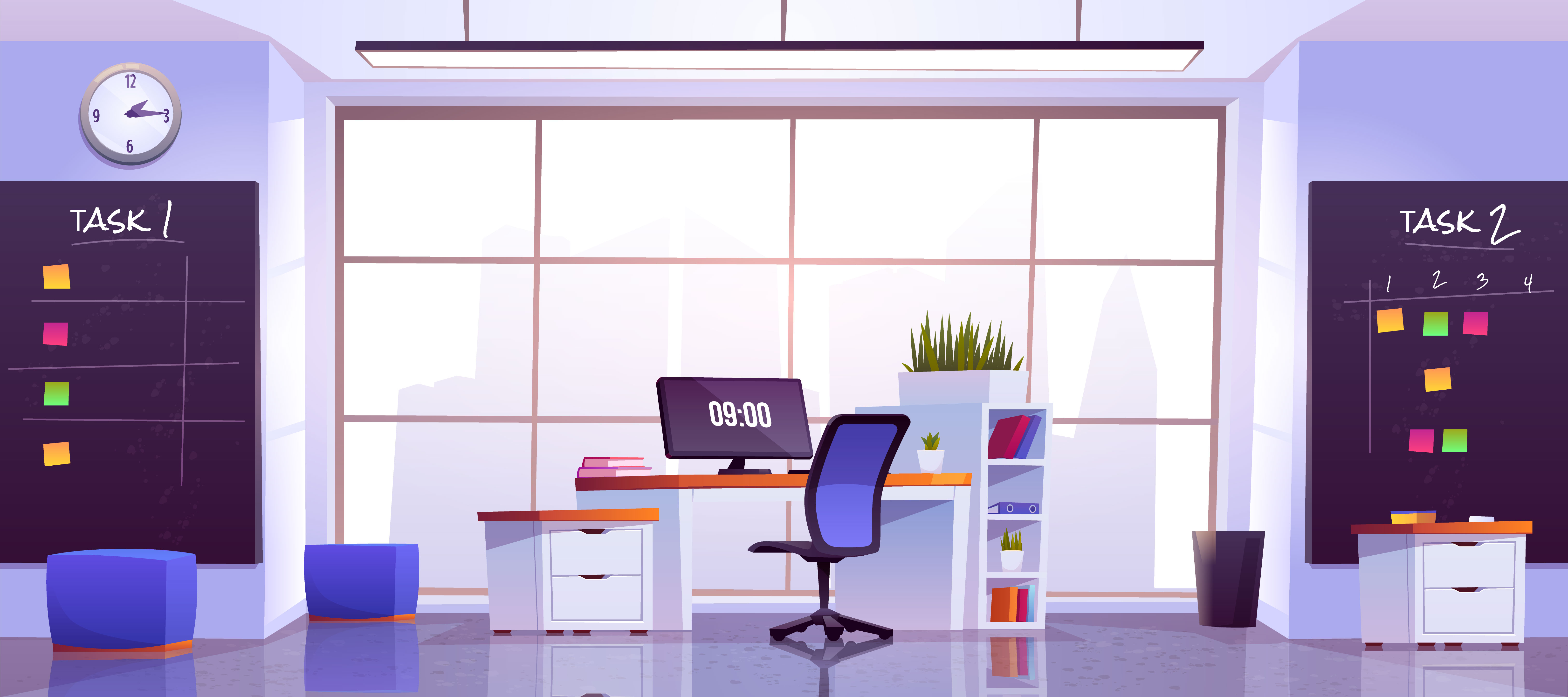September 15, 2022
WORKPLACE WELLNESS

Photo by Mina Ivankovic on Unsplash - Image by @upklyak on freepik
Since we spend more than a third of our time at the office, it is important to maintain a good balance for both our professional efficiency and our personal well-being...
- Creating our workspace -
Well-being at work starts with our environment itself : It must allow us to stay inspired, focused and productive.
Intentionally arranging our workspace can improve our focus, productivity and significantly reduce our stress at work. If we are lucky, we have a say in the layout of our office and its organization. Either way, we should not hesitate to let our employer know about our needs.
So let's think about the conditions that allow us to work optimally : A quiet space? Lots/little light? Face/back to the door? Facing the window?
- Ergonomic layout -
Working long hours, at a desk with poor posture, can wreak havoc on our bodies over time.
It is better to arrange our office : height of our screens, position of our keyboard and our mouse, learn to sit correctly (chair or yoga ball) :
Ergonomics having become important for many companies and organizations, some offer internal ergonomic assessments (via prevention advisors or occupational medicine), so we will avoid positioning ourselves between our screen and the window (to avoid the reflections).
- CO² -
There are key reasons that justify adding a few plants to our workspace (Note Bene : Let's not turn our office into a botanical garden, where we will have to clear our way with a machete) :
- Standing up regularly -
When we're caught up in our stride or under tight deadlines, it's hard to get away from our computer. But we should get up from our desks at least every half hour. It may seem almost impossible, or as it will disrupt our focus and decrease our productivity, but we have to find the timing that works for us. And just getting up to turn off an alarm across the room already counts for something.
Eye strain from screens (computer, tablet, phone, TV, etc.) is real and can lead to dry, irritated eyes, blurred vision and headaches. When working on a computer, we have to follow the 20/20/20 rule : Every 20 minutes, look at something 20 feet (+/- 6m) away for 20 seconds.
The wellness advice is obviously to go out during the day for a walk. Not only will it boost our energy and creativity (especially in the afternoon), but it will provide us with vitamin D and fresh air.
- Cultivate the positive in our relationships -
Our colleagues are the ones we spend most of our time. And negative relationships add stress and discomfort to our work environment, which can even make us feel sick of work.
We have to maintain positive relationships by being friendly and courteous, known for our professionalism and team spirit. Although we cannot control the behaviour of others, we should not encourage them to make hallway noises and gossip about others.
Let's make an effort to get to know our colleagues, even if they tend to get on our nerves. Let us be careful not to engage in conversations that will lead nowhere.
Our appearance can also influence our confidence, how we see ourselves and how we are perceived. While there's absolutely nothing wrong with taking a casual approach, many people feel better wearing dressier clothes.
- Plan our lunches -
As part of a healthy diet, lunchtime is essential. If we haven't planned ahead, we could find ourselves at the mercy of options available nearby, which are rarely the healthiest. It is useful (not mandatory) to create a weekly meal plan, which describes what we will eat for lunch. This effort guarantees us to have the ingredients we need, without losing sight of the quality and quantities (Kcal) of what we are going to eat.
- Know when to unplug -
The demands of our responsibilities and the increased ability to connect with smartphones, tablets, laptops and Wi-Fi hotspots easily take over from usefulness, to becoming detrimental and even addictive (working from anywhere, anytime).
A healthy work-personal life balance means different things to different people. For some, that means keeping fairly strict office hours of 9:00 a.m. to 5:00 p.m., then quitting work and spending time with our family and/or friends. For others, it means working long, intense hours, then enjoying a long period of rest away from work with loved ones.
Conclusions
If we are to be counted among those who spend more than 8 hours a day in the office, we are perfectly aware of the importance of finding a harmony between our private well-being and the workplace one. And even if working in an office is not really considered as a « physical » work, it is nonetheless exhausting and can be the cause of certain ailments and consequences on our mind and our balance.
What do you think?
